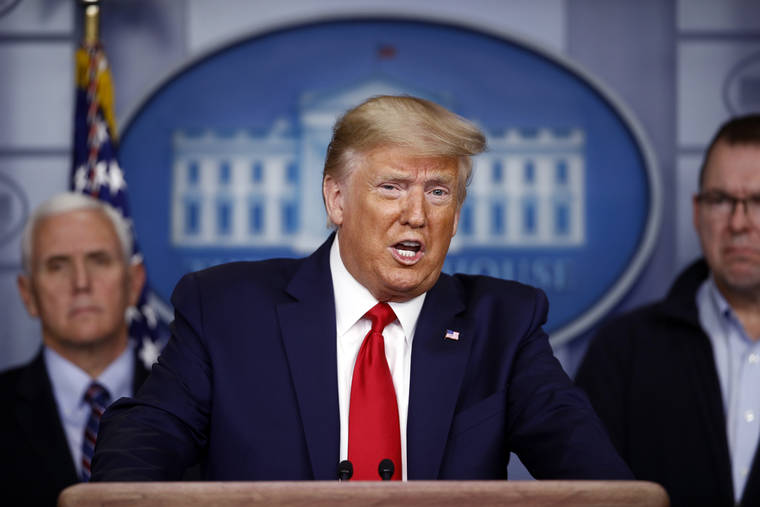WASHINGTON — Top-level negotiations between Congress and the White House churned into the night Sunday over a now nearly $2 trillion economic rescue package, as the coronavirus crisis deepened, the nation shut down and the first U.S. senator tested positive for the disease.
As President Donald Trump took to the podium in the White House briefing room and promised to help Americans who feel afraid and isolated as the pandemic spreads, the Senate voted against advancing the rescue package. But talks continued on Capitol Hill.
“I think you’ll get there. To me it’s not very complicated: We have to help the worker. We have to save the companies,” Trump said. “We’re enduring a great national trial and we will prove that we can meet the moment. We’re at war.”
Inside the otherwise emptied out Capitol, the draft aid bill was declared insufficient by Democrats, who argued it was tilted toward corporations and did too little to help workers and health care providers. Republicans returned to the negotiating table.
With a population on edge and shell-shocked financial markets poised for the new work week, Washington labored under the size and scope of the rescue package that’s more ambitious than any in recent times — larger than the 2008 bank bailout and 2009 recovery act combined.
“Our nation cannot afford a game of chicken,” warned Senate Majority Leader Mitch McConnell, R-Ky., his voice rising on the Senate floor Sunday night. He set a new vote for today.
But Democrats say the largely GOP-led effort does not go far enough to provide health care and worker aid, and fails to put restraints on a proposed $500 billion “slush fund” for corporations.
Senate Democratic leader Chuck Schumer, D-N.Y., meeting late with Treasury Secretary Steven Mnuchin, said the draft package “significantly cut back our hospitals, our cities, our states, our medical workers and so many others needed in this crisis.”
Democrats won a concession — to provide four months of expanded unemployment benefits, rather than just three as proposed, according to an official granted anonymity to discuss the private talks.
While the congressional leaders worked into the night, alarms were being sounded from coast to coast about the wave of coronavirus cases about to crash onto the nation’s health system.
New York City Mayor Bill de Blasio had dire, urgent news from the pandemic’s U.S. epicenter: “April and May are going to be a lot worse,” he said on NBC’s “Meet the Press.”
De Blasio all but begged Washington to help procure ventilators and other medical supplies. He accused the president of “not lifting a finger” to help.
Trump urged Congress to get a deal done and, during the Sunday briefing, responded to criticism that his administration was sluggish to act.
He cited his cooperation with the three states hardest hit — New York, Washington and California — and invoked a measure to give governors flexibility in calling up the national guard under their control, while the federal government covers the bill.



